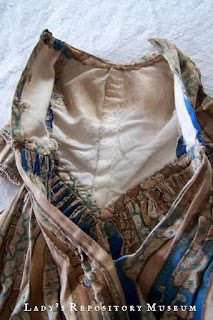New eBay Specials & ETSY SALE!
Isn't she precious? You can find Hera on eBay this week, along with other special chosen dollys and whatnots to celebrate my 5th consecutive year being chosen for Early American Life Magazine's Directory of Top 200 American Craftsmen! And I'm not just celebrating on eBay...... EVERYTHING in my ETSY store THIS WEEK, is 35% OFF~ all you have to do is enter the coupon code EAL2012 at your checkout!
▼
Sunday, July 29, 2012
Monday, July 23, 2012
An 1840 Fondue.....
No. Not the eating variety. Everyone so enjoyed Mary's bottle green silk gown I posted earlier, I thought that I would share this one with you too~ as early prints are my absolute favorites....and of coarse, my favorite colors are blue and brown, so this c1840 fan front printed cotton dress is very dear to my heart and I know you will enjoy it as well.
The fan front was a cunning use of optics that the dressmakers utilized to make our waists look smaller~ the close tight gathers at the base of the fan, elongate the torso and draw ones eye downward, taking the focus off the horizontal width of the waist and placing it at the center where the gathers are.
As you can see from the side, the waist is actually quite broad, nearly in line with the width of the shoulders.
Wonderful piping is another detail of early handwork that I, personally, dont think a person could ever over~do. I love piping. The waist is 'gauged', meaning tiny perfectly evenly spaced gathers, each stitched to the waistband with a single perfect little whip stitches.
Narrow pagoda shape sleeves, I would say 3/4 length~ white mull undersleeves would have been worn underneath to cover the arm to the wrist.
Back closure of hidden brass hook and eyes~ by hidden I mean set back from the edge about an inch, so when fastened, there is a flap of fabric that covers them keeping ones back nice and tidy and totally covered!
Of coarse all is stitched by hand in weensie little stitches. I have a couple other childrens gowns in similar really vibrant Prussian blue ombre prints~ the period correct term for the shading of light to dark is fondue. I love fondue...and this type has no calories ;)
Inside the bodice is lined with a single center busk pocket. The skirting is unlined.
The back is a little more vibrant than the front, but overall, there is not so much fading. These electric blues were all the rage in 1840s and early 1850s.
The fondue prints were highly prized for their shaded colors, and offered quilt makers nearly an entire palette of colors to choose from in just one fabric~ by the way they cut the pieces, all different looks could be achieved. Many gowns like this one ended up cut up into pieces for patchwork and applique quilts, making actual surviving garments of fondue printed cottons somewhat uncommon
Size? Well, as you can see, this is an even more extra special dress, as it is a mere 12" from shoulder to hem, sized for a very special dolly. One has to wonder, if her Ladye Pet had one to match......
No. Not the eating variety. Everyone so enjoyed Mary's bottle green silk gown I posted earlier, I thought that I would share this one with you too~ as early prints are my absolute favorites....and of coarse, my favorite colors are blue and brown, so this c1840 fan front printed cotton dress is very dear to my heart and I know you will enjoy it as well.
The fan front was a cunning use of optics that the dressmakers utilized to make our waists look smaller~ the close tight gathers at the base of the fan, elongate the torso and draw ones eye downward, taking the focus off the horizontal width of the waist and placing it at the center where the gathers are.
As you can see from the side, the waist is actually quite broad, nearly in line with the width of the shoulders.
Wonderful piping is another detail of early handwork that I, personally, dont think a person could ever over~do. I love piping. The waist is 'gauged', meaning tiny perfectly evenly spaced gathers, each stitched to the waistband with a single perfect little whip stitches.
Narrow pagoda shape sleeves, I would say 3/4 length~ white mull undersleeves would have been worn underneath to cover the arm to the wrist.
Back closure of hidden brass hook and eyes~ by hidden I mean set back from the edge about an inch, so when fastened, there is a flap of fabric that covers them keeping ones back nice and tidy and totally covered!
Of coarse all is stitched by hand in weensie little stitches. I have a couple other childrens gowns in similar really vibrant Prussian blue ombre prints~ the period correct term for the shading of light to dark is fondue. I love fondue...and this type has no calories ;)
Inside the bodice is lined with a single center busk pocket. The skirting is unlined.
The back is a little more vibrant than the front, but overall, there is not so much fading. These electric blues were all the rage in 1840s and early 1850s.
The fondue prints were highly prized for their shaded colors, and offered quilt makers nearly an entire palette of colors to choose from in just one fabric~ by the way they cut the pieces, all different looks could be achieved. Many gowns like this one ended up cut up into pieces for patchwork and applique quilts, making actual surviving garments of fondue printed cottons somewhat uncommon
Size? Well, as you can see, this is an even more extra special dress, as it is a mere 12" from shoulder to hem, sized for a very special dolly. One has to wonder, if her Ladye Pet had one to match......










